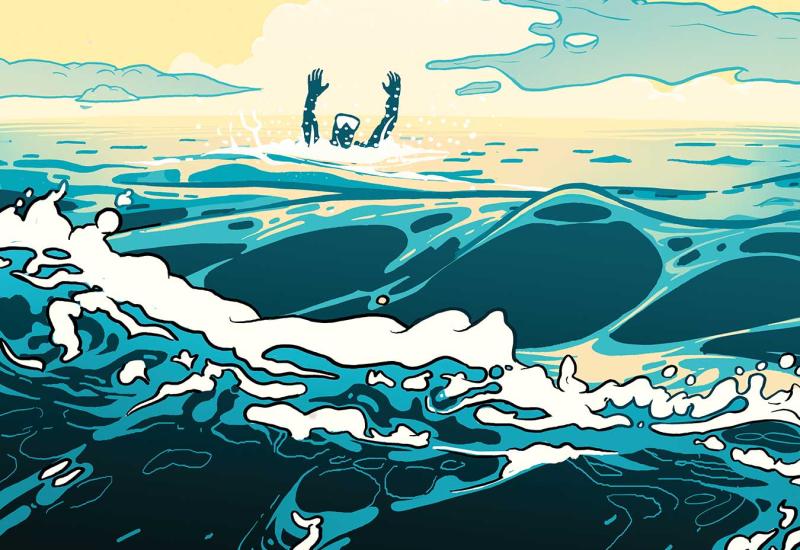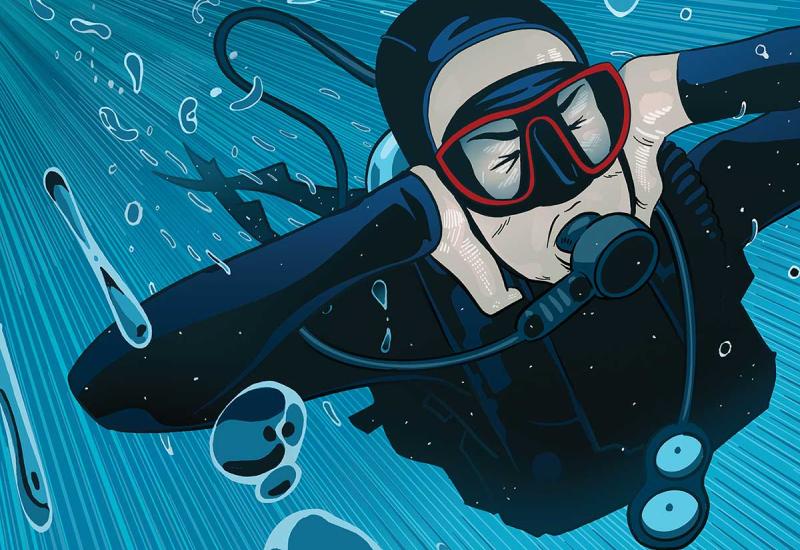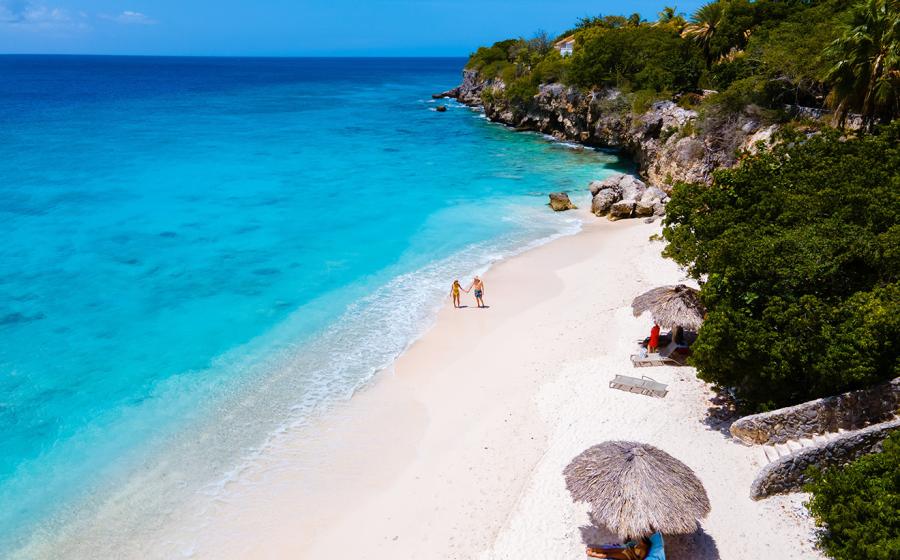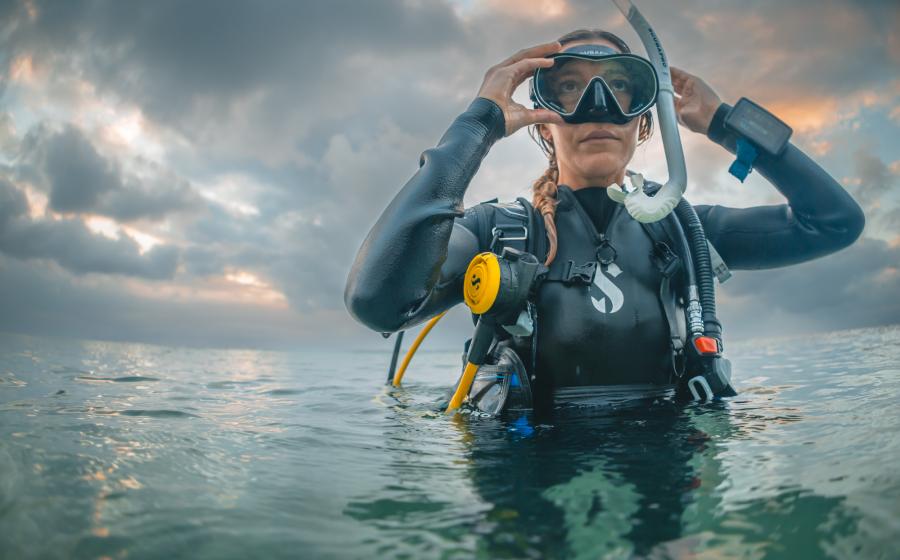Wrecked Dive

_Bob and Bill struggled toward the beach, occasionally looking over their shoulders in disbelief at the spot where their boat had been, where it should have been waiting for them at the end of the dive. They swam for hours against current, wind and waves, with the cold taking as much toll on them as the exhaustion. Chilled to the bone and the air in their tanks long depleted, they knew they had only two options--make it to the beach, or die. When Bill's feet bumped the seafloor sloping down from the beach, they surged forward with new energy. But just as they collapsed on the sand, reality hit them: They were dangerously cold and exhausted with no food, water, communication equipment or warm clothes, on a beach ringing a deserted island, a mere speck in a chain of islands, and they hadn't told anyone where they were going._
- Never leave a vessel unattended on the surface. The boat can break anchor and drift away with a current change or a big wave; it can be stolen or "salvaged" by well-meaning people who find it unattended; or, as in the case of Bob and Bill, the boat can sink--a rogue wave can capsize it or fill the hull with water, and bilge pumps can fail.
- The person or persons left on board during a dive should be qualified to operate the radios, the emergency devices and the boat itself, in case of emergency.
- Every vessel should be equipped with at least one radio and an EPIRB, an emergency locator beacon affixed to a vessel that self-activates when the boat sinks. Some divers venturing into remote locations on their own also carry personal locator beacons similar to a boat's EPIRB, so they can be located by emergency services even if they are separated from the boat.
- A float plan is a vital part of every private boat dive. The person organizing the outing should find a responsible person on shore and give him or her a clear plan that includes where the divers plan to dive, what time they anticipate leaving, what time they anticipate returning, the number of divers and/or passengers on the boat, the type of vessel and the types of communication and emergency equipment on board. All of this information can be important to professional search crews should an emergency occur. This onshore contact person should make sure the boat returns on schedule, and he or she should know whom to notify in an emergency, including the relevant search-and-rescue agency for the area and family members of the people on board.
- Bill and Bob ignored all of these rules. They failed to leave someone on board the vessel. They did not have an EPIRB as part of their safety equipment. And they did not file a float plan with someone on shore. However, when the unthinkable occurred, they kept their wits and responded effectively. They also benefited from a tenacious researcher who systematically called the divers' friends and acquaintances to find the information that should have been in the float plan.
The Divers
Bob and Bill were both middle-aged divers in good health, with advanced diving certifications. They were active boaters who frequently used a small private boat to dive sites throughout the numerous islands near their homes.
The Dive
The two divers loaded their equipment and headed offshore as they did almost every weekend. The sea conditions were moderate, with three-foot waves and very little chop, and after driving for an hour and a half, they arrived at their site, dropped anchor and assembled their gear. Bob and Bill jumped into the 50-degree water and descended down the anchor line to make sure the anchor was set. Their planned depth was 50 feet, visibility was fairly good, 15 to 20 feet, and there was virtually no current. Because they were leaving their boat unattended on the surface, the divers planned to stay close to their entry point.
The Accident
The dive went smoothly. Surface conditions were still relatively calm when Bob and Bill surfaced at the end of their dive, and they spent a few moments chatting about the dive before Bill realized he couldn't see the boat. The divers quickly oriented themselves to the closest beach to make sure they were in the right spot. They were, but the boat was nowhere in sight. Knowing that at any moment the shifting tide could sweep them out to sea, they quickly decided their only hope was to swim for shore. It didn't seem too far away as they started their swim, but over water, distances can be deceptive.
It took nearly three hours of hard swimming before they reached dry land. By that time, the two were chilled to the bone despite their heavy wetsuits, and they reached the beach in a complete state of exhaustion. Reaching dry land buoyed their spirits until they remembered that they hadn't filed a float plan with anyone onshore. They had no radio, no food, no water and the only thermal protection they had worn on their dive was soaked. Worst of all, they were on a tiny island in a chain of dozens of others, where it could take search-and-rescue personnel days to find them.
The Rescue
A family member of one of the divers grew concerned when the pair hadn't returned to the dock a couple hours after they were expected. The authorities were notified, but as Bob and Bill suspected, no one had any idea where to search. Eventually, someone who had overheard the divers discussing their dive plan came forward to provide insight into the divers' potential location. By this time, it was late in the day. A quick search was mounted, and the divers were soon spotted on the deserted beach. A later search of the area would find the divers' boat lying right where it was anchored--but 50 feet below the surface. Because no one was on board when the boat sank, the reason for the sinking remains unknown.
Analysis
Many divers who own boats prefer to dive from their own vessels. The cost of fuel and maintenance does not make this substantially cheaper, but it does give divers more freedom to select their dive sites and a lot of flexibility in their dive schedule. However, to dive safely from a private boat, certain precautions are mandatory:
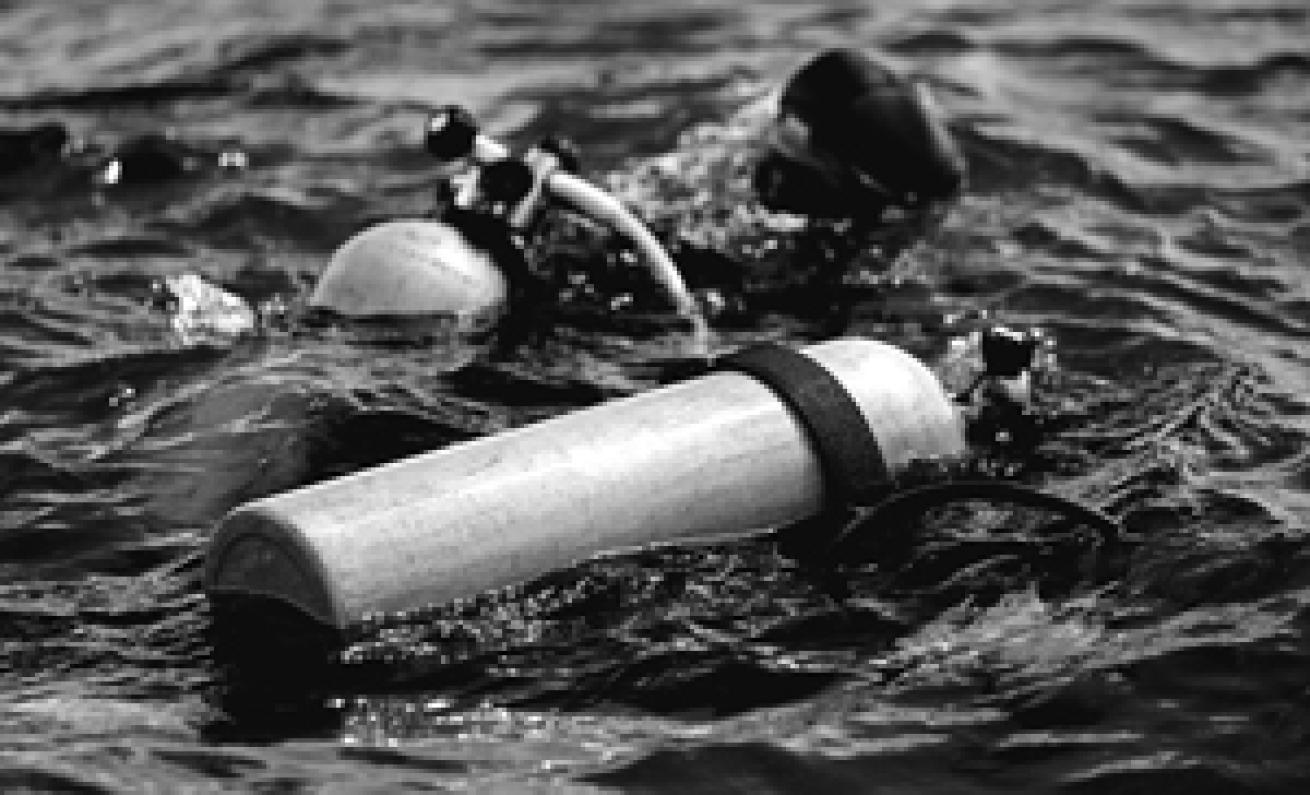
Bob and Bill struggled toward the beach, occasionally looking over their shoulders in disbelief at the spot where their boat had been, where it should have been waiting for them at the end of the dive. They swam for hours against current, wind and waves, with the cold taking as much toll on them as the exhaustion. Chilled to the bone and the air in their tanks long depleted, they knew they had only two options--make it to the beach, or die. When Bill's feet bumped the seafloor sloping down from the beach, they surged forward with new energy. But just as they collapsed on the sand, reality hit them: They were dangerously cold and exhausted with no food, water, communication equipment or warm clothes, on a beach ringing a deserted island, a mere speck in a chain of islands, and they hadn't told anyone where they were going.
The Divers
Bob and Bill were both middle-aged divers in good health, with advanced diving certifications. They were active boaters who frequently used a small private boat to dive sites throughout the numerous islands near their homes.
The Dive
The two divers loaded their equipment and headed offshore as they did almost every weekend. The sea conditions were moderate, with three-foot waves and very little chop, and after driving for an hour and a half, they arrived at their site, dropped anchor and assembled their gear. Bob and Bill jumped into the 50-degree water and descended down the anchor line to make sure the anchor was set. Their planned depth was 50 feet, visibility was fairly good, 15 to 20 feet, and there was virtually no current. Because they were leaving their boat unattended on the surface, the divers planned to stay close to their entry point.
The Accident
The dive went smoothly. Surface conditions were still relatively calm when Bob and Bill surfaced at the end of their dive, and they spent a few moments chatting about the dive before Bill realized he couldn't see the boat. The divers quickly oriented themselves to the closest beach to make sure they were in the right spot. They were, but the boat was nowhere in sight. Knowing that at any moment the shifting tide could sweep them out to sea, they quickly decided their only hope was to swim for shore. It didn't seem too far away as they started their swim, but over water, distances can be deceptive.
It took nearly three hours of hard swimming before they reached dry land. By that time, the two were chilled to the bone despite their heavy wetsuits, and they reached the beach in a complete state of exhaustion. Reaching dry land buoyed their spirits until they remembered that they hadn't filed a float plan with anyone onshore. They had no radio, no food, no water and the only thermal protection they had worn on their dive was soaked. Worst of all, they were on a tiny island in a chain of dozens of others, where it could take search-and-rescue personnel days to find them.
The Rescue
A family member of one of the divers grew concerned when the pair hadn't returned to the dock a couple hours after they were expected. The authorities were notified, but as Bob and Bill suspected, no one had any idea where to search. Eventually, someone who had overheard the divers discussing their dive plan came forward to provide insight into the divers' potential location. By this time, it was late in the day. A quick search was mounted, and the divers were soon spotted on the deserted beach. A later search of the area would find the divers' boat lying right where it was anchored--but 50 feet below the surface. Because no one was on board when the boat sank, the reason for the sinking remains unknown.
Analysis
Many divers who own boats prefer to dive from their own vessels. The cost of fuel and maintenance does not make this substantially cheaper, but it does give divers more freedom to select their dive sites and a lot of flexibility in their dive schedule. However, to dive safely from a private boat, certain precautions are mandatory:
- Never leave a vessel unattended on the surface. The boat can break anchor and drift away with a current change or a big wave; it can be stolen or "salvaged" by well-meaning people who find it unattended; or, as in the case of Bob and Bill, the boat can sink--a rogue wave can capsize it or fill the hull with water, and bilge pumps can fail.
- The person or persons left on board during a dive should be qualified to operate the radios, the emergency devices and the boat itself, in case of emergency.
- Every vessel should be equipped with at least one radio and an EPIRB, an emergency locator beacon affixed to a vessel that self-activates when the boat sinks. Some divers venturing into remote locations on their own also carry personal locator beacons similar to a boat's EPIRB, so they can be located by emergency services even if they are separated from the boat.
- A float plan is a vital part of every private boat dive. The person organizing the outing should find a responsible person on shore and give him or her a clear plan that includes where the divers plan to dive, what time they anticipate leaving, what time they anticipate returning, the number of divers and/or passengers on the boat, the type of vessel and the types of communication and emergency equipment on board. All of this information can be important to professional search crews should an emergency occur. This onshore contact person should make sure the boat returns on schedule, and he or she should know whom to notify in an emergency, including the relevant search-and-rescue agency for the area and family members of the people on board.
- Bill and Bob ignored all of these rules. They failed to leave someone on board the vessel. They did not have an EPIRB as part of their safety equipment. And they did not file a float plan with someone on shore. However, when the unthinkable occurred, they kept their wits and responded effectively. They also benefited from a tenacious researcher who systematically called the divers' friends and acquaintances to find the information that should have been in the float plan.


